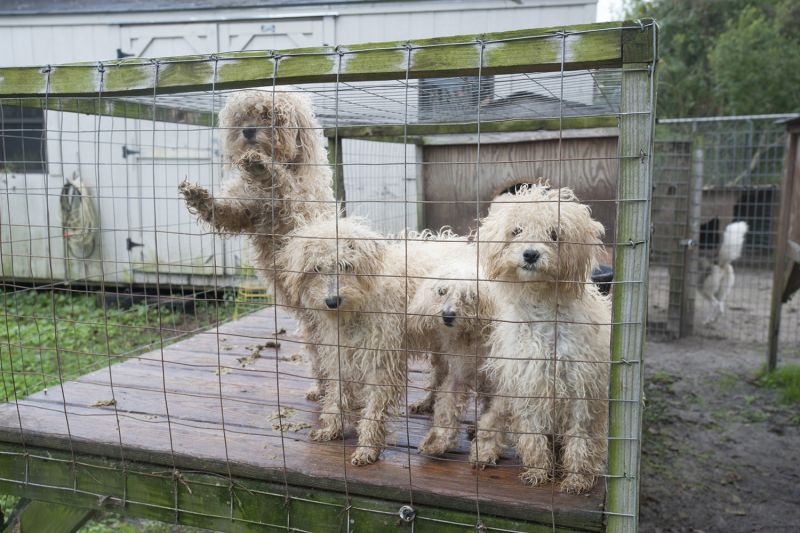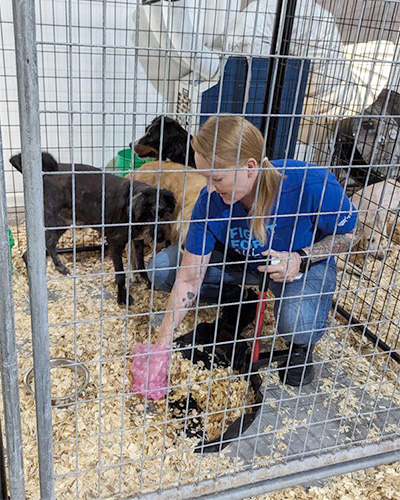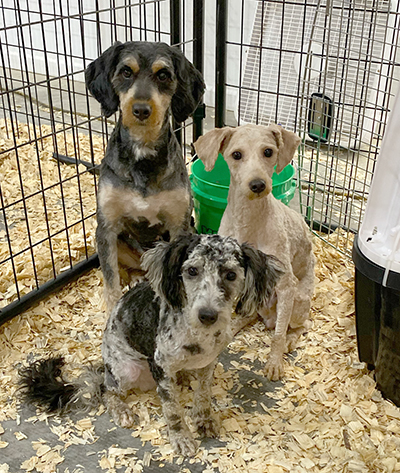Blog: Who pays the price for puppy mills?
HumanePro’s social media specialist reflects on her first puppy mill experience
March 13, 2024

I first heard the term “puppy mill” in 2012 soon after I started volunteering at my local shelter, the Iowa City Animal Care and Adoption Center. A decade later, when I took a job at the Humane Society of the United States, I learned more about commercial breeding facilities and the horrible conditions the dogs endure.
But it’s one thing to read about animal cruelty and another to witness the aftermath first-hand.
My first puppy mill experience came in August 2023. I received an urgent email from the volunteer coordinator with the Iowa City shelter asking for assistance with an emergency intake of what was originally projected to be about 80 dogs. Unsure what to expect, I changed into my volunteer gear and headed out the door.
For the next few hours, I worked alongside shelter staff and other volunteers as we rushed to put together kennels and transport supplies from the shelter to the off-site location where the dogs would temporarily be housed. I learned that the dogs and puppies were from an alleged puppy mill in Riverside, just 15 miles south of the shelter.
That evening, transport vehicles filled with golden doodles, poodles, Bernese mountain dogs and golden retrievers started to arrive at our temporary shelter. When I stepped inside one of the vehicles to help a fellow volunteer coax a dog out of his crate, I was hit with the smell of feces. One of the Bernese mountain dogs had had an accident in his crate and was terrified to move.
Over the next few days, with outdoor temperatures topping 100 degrees, shelter staff coordinated a massive recovery effort right before my eyes.
Most of the dogs were anxious and undersocialized except for a few who seemed desperate for human attention. Many were severely matted, underweight or showing signs of heat distress and needed immediate medical care. All together, the shelter took in 131 dogs and puppies from this one breeder. Sadly, nine of the dogs didn’t make it.
Over the next few days, with outdoor temperatures topping 100 degrees, shelter staff coordinated a massive recovery effort right before my eyes. When a mom dog and her puppies tested positive for parvovirus, the team scrambled to disinfect and reorganize the building to ensure no other pups were exposed to the disease.

As I cleaned kennels and assisted with the myriad tasks involved in caring for so many animals, I felt proud of my shelter and its volunteers, who worked tirelessly to surmount every challenge. I was proud of my community, whose concern for these dogs manifested in an outpouring of offers to help. Local veterinarians and groomers volunteered their services, and the shelter’s hallways quickly filled with mountains of donated supplies.
State and national animal welfare organizations also stepped up in a big way. Even at a time when shelters and rescues across the nation were overwhelmed, many organizations found space to take in some of the Riverside pups. The wonderful folks at the Bissell Pet Foundation transported 90 of the dogs to shelters in Michigan and Eastern Iowa, significantly easing the burden on my shelter.
I never saw Sunset Valley Farm, the property where the dogs lived before their rescue. But I soon learned that the owner had appeared three times in the Horrible Hundred report, an annual list of problem puppy mills compiled by the HSUS. Reading through recent Horrible Hundred reports, I got a glimpse of the conditions these dogs had endured.
Inspection reports from the past five years noted piles of feces, rodent infestations, excessive grime and dogs suffering from a lack of veterinary care. In September 2022, an inspector from the U.S. Department of Agriculture found three underweight dogs, including two nursing mothers and a puppy who was so thin that the inspector noted the condition “could result in the death of the animal.” The USDA later gave the owner an official warning.
It’s the same story over and over: people who have been profiting off dogs for years, sometimes decades, with zero concern for the animals’ suffering.
I don’t know what that warning entailed, but it did nothing to help the dogs. The owner simply dropped his USDA license in spring 2023 and continued doing business until August, when the Iowa Department of Agriculture and Land Stewardship gave him 24 hours to correct problems in the facility. The owner chose to surrender the dogs instead.
The descriptions of Sunset Valley Farm were difficult to read, but they were far from the worst. For example, a Missouri Department of Agriculture inspector documented this sight at a breeder who has appeared in the Horrible Hundred report eight times: “The boxer’s ribs could be easily counted from a distance, her hip bones and spine also visible. Her five tiny puppies were curled up below her emaciated body, sleeping next to an empty bowl.” Unbelievably, as of February 2024, this breeder is still licensed by the state and the USDA.

It’s the same story over and over: people who have been profiting off dogs for years, sometimes decades, with zero concern for the animals’ suffering. Insufficient laws and lax enforcement that allow this misery to continue. When authorities finally take action and seize animals, or the owner relinquishes them, it’s shelters, other animal welfare nonprofits and taxpayers who pick up the tab.
I was proud to play a part in the rescue of dogs and puppies from the Sunset Valley breeder. It made me happy to know that more than 100 animals would now have the kind of life they should have always had, as beloved companions.
But I couldn’t help thinking about all the ones who didn’t get that chance, who suffered and died unseen throughout the years the breeder had been licensed by the state and the USDA. I thought about how this massive rescue took time and resources away from the animals who were already in our shelter, some of whom had been waiting for months to find their new home. And I couldn’t help wondering why, in a nation of dog lovers, puppy mills are allowed to exist.
In recent years, the HSUS has helped shut down numerous inhumane breeders, persuaded dozens of pet stores to stop selling puppies and helped educate the public about the cruelties inherent in breeding mills. To date, seven states have prohibited the sale of puppies in pet stores, and more than 480 local governments have enacted similar bans.
But with an estimated 10,000 puppy mills still operating in the U.S., there’s a lot of work to be done. I encourage you to check out the Horrible Hundred reports and read about the puppy mills in your region. Then harness your outrage and help us end this cruelty.
Here are four key steps you can take:
- Sign your support for the Better CARE for Animals Act, then ask your shelter’s leader to declare your organization’s support for this federal legislation that would allow the U.S. Department of Justice to assist in more puppy mill cases and other cases of animal mistreatment by USDA-licensed facilities.
- Advocate for the Puppy Protection Act, a federal bill that would significantly improve the minimum care standards for USDA-licensed breeding facilities.
- Check out An Advocate's Guide to Stopping Puppy Mills to learn how you or your organization can raise public awareness of puppy mills, lobby for local ordinances to combat puppy mills, persuade pet stores in your area to stop selling puppies and more.
- Sign up to receive action alerts about HSUS legislative efforts in your state.


